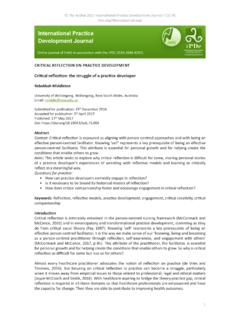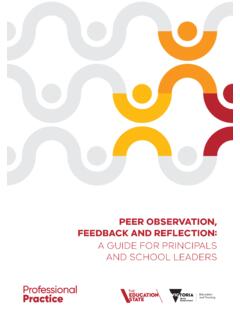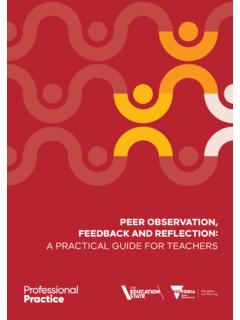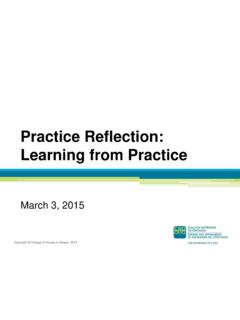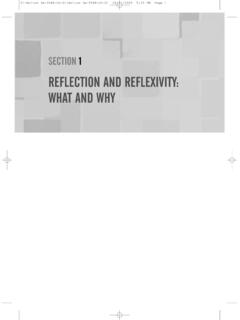Transcription of John Dewey’s Pragmatism: Implications for Reflection in …
1 Michigan Journal of Community Service LearningSpring 2015, pp. 64-73 John Dewey s pragmatism : Implications for Reflection in Service-LearningHarry Clark MadduxDeborah DonnettAppalachian State University This essay examines the relationship of philosophical pragmatism to the practice of Reflection in service-learning. Service-learning theory and practice often elides over or ignores entirely the principles of inquiryas developed by Dewey. The exercise of reflective thought requires that educators create a situation of dis-comfort for learners, and mandates that students examine the warrants of settled belief ( , assumptions).
2 Abrief historical overview of the major strains of American pragmatism is presented, followed by a summativereview of important treatments of Reflection in service-learning. The elements of inquiry in Dewey are thenanalyzed and their Implications for service-learning considered. strengths and weaknesses of our present intellectualhabits. Reflection arises as a result of a perplexingsituation and as such one of its dominant characteris-tics is that it is disconcerting. As Dewey framed it inHow We Think(1910), reflective thought is both eulogistic and emphatic (p.)
3 4). Reflection is whereold thoughts are either put to rest or rehabilitated andwhere a certain quality of indicativeness in our expe-rience a sense that what we encounter in uncertainmoments of existence implies more than bare percep-tion allows us to examine what is both sound andunsound in our current knowledge. This means that Reflection is something very likean intellectual turning point in our lives, and itdeserves to be treated with that quality of serious-ness. What we ask students to do in Reflection is notreorder existing cognitive categories, but to deter-mine whether or not a new, disruptive experience canbe assimilated into present frameworks, or if, moreradically, one set of ideas must be put to rest so thatnew ones can, albeit provisionally, take their Implications are, as this essay will attempt toshow, that Reflection can never be a blunt tool ofactive learning.
4 As situational as inquiry itself, reflec-tion must emerge from the specific experience thatgives rise to it and, if new learning is to result, lead toa re-evaluation of assumptions ( , warrants ofbelief) and result in an instrumental claim that can beapplied in later this argument may seem counterintuitive,especially in light of the decades-long, thoughnotably self-reported, success of service-learning inasking students to rethink their experience throughreflection, we will endeavor to be explicit in how ourideas fit into the framework of the field.
5 We begin byNo figure in the literature of service-learning andcivic engagement is so widely cited as John Dewey;no thinker is more commonly misconstrued. Thisessay argues that a better understanding of the philo-sophical project of John Dewey will improve our useof Reflection in service-learning. Despite, or perhapsbecause of, Eyler and Giles (1994) and Saltmarsh s(1996) foundational arguments that Dewey s theoriesof cognition provide a sound basis for the practice ofservice-learning, it is our contention that the fullimplications of Dewey s thought for service-learninghave not been well understood, much less s name, and the notion of Reflection thataccompanies it.
6 Can easily acquire a fetishistic qualitythat prevents the robust application of his philosophyto the practice of service-learning and Dewey as a pragmatist entails eval-uating many of our ideas about service-learning andparticularly the role of Reflection in it. There are fourprincipal concepts in the philosophical tradition ofpragmatism that bear on the practice of Reflection inservice-learning. First, thought and learning begin inuncertainty in situations that are ambiguous ordubious. Second, the outcomes of thought are habitsof action that appease doubt.
7 Third, the actions thatresolve doubt also result in habits of mind that directsubsequent thought. And fourth, knowledge itself isproductive: it results in behaviors and beliefs thathave observable consequences on our own lives andon the mental as well as social lives of as a way of learning necessarily entailsan instrumental mode of interrogation of existingschema of thought. It does not lead to new knowl-edge without first causing us to interrogate theImposed-MJCSL 3/9/15 9:56 AM Page 6465offering a necessarily truncated summary of the his-torical context of John Dewey and his brand of prag-matism.
8 We explore how Dewey s pragmatic ideas,what he called an instrumental approach to mean-ing (1903, p. 15), constitute responses to previouspragmatists. Next, we examine how the notion ofreflection is typically construed in the service-learn-ing literature. We will not attempt to be exhaustive inthis review, but representative, summarizing earlyand formative considerations of Reflection as well asmore recent treatments of it. Finally, we explore theimplications of Dewey s philosophy as it relates tolearning and Reflection upon thought. Dewey and the Historical Context of PragmatismPragmatism is arguably America s distinctive con-tribution to philosophy (Ayer, 1968; Moore, 1961;Thayer, 1968).
9 It developed in the mid- to late-nine-teenth century and continued to exercise an influencewell into the late twentieth century through the quitedifferent applications of it by Quine (1992),self-described as an epistemological naturalist, andRichard Rorty (1991), who is often thought of as akind of postmodern pragmatist. pragmatism , then,like other philosophical labels, is a contested notionand more easily defined negatively or ostensibly thantaxonomically. Louis Menand (2001) identifies the origins ofpragmatism in an attitude of skepticism toward abso-lutist ideologies that arose out of the carnage of theCivil War.
10 pragmatism is also, however, a response towhat philosophers term spectator theories of truthand meaning: the notion that in learning we are pas-sive receptors of sensory stimuli that, as Locke had it,inscribe themselves on the individual. pragmatism ,by contrast, asserts that the individual is preeminent-ly active in the construction of his or her world, andthat the meaning we derive in our lives is the outcomeof a complex relationship between received ideas andpresent experience. The upshot, agreed upon by every pragmatistthinker from Charles Sanders Peirce to RichardRorty, is that knowledge is radically contingent aswell as incremental in operation.










